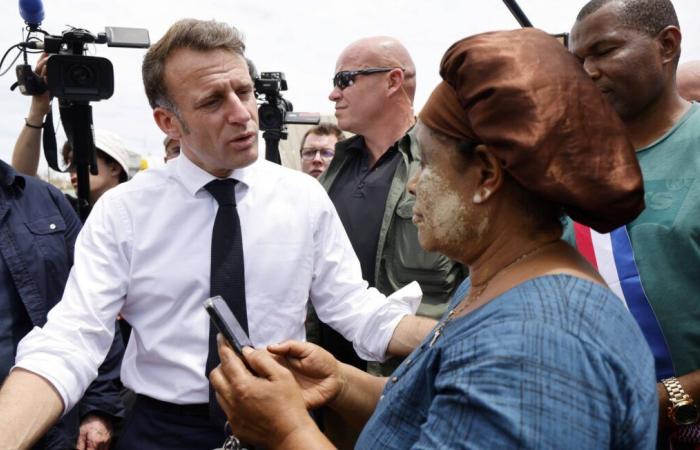White shirt and long sleeves rolled up, Emmanuel Macron confronted Mahorais delivered to despair and anger, this Thursday in Mayotte, five days after the passage of Cyclone Chido which devastated the French Pacific island. “Don’t pit people against each other. If you pit people against each other, we're screwed. Because you are happy to be in France. Because if it wasn’t France, you would be 10,000 times more in trouble,” said the President of the Republic, definitely not afraid of the idea of expressing himself with a few crude words.
And this seems to be recurrent with him, between the “crazy money” from social minimums and “those who make a mess”, not to mention the latest revelations made by The World on his vocabulary, immediately denied by the Elysée. However, in public, the president also graced us with some largely outdated words, such as “croquignolesque” or “ripoliner”.
Also, at 20 Minuteswe wondered about the language register used by Emmanuel Macron depending on the context and contacted Florent Moncomble, linguist and teacher-researcher at Artois University in Arras, for whom “it is less about jargon than about the use of a slang repertoire”, full of profanity, reflecting “a certain feeling of impunity”.
From “croquignolesque” to you “would be in shit”, there is a sort of big linguistic gap… How many registers does Emmanuel Macron use?
This way of navigating from one repertoire to another, of mixing them, of switching from language entirely consistent with what is expected of a leading political figure, and suddenly switching to a more familiar repertoire, is what we find among people who have benefited from a high level of education, which is the case of Emmanuel Macron and almost all political leaders.
And this is something that people who already enjoy a certain status, a certain prestige can do with a certain feeling of impunity: If I am President of the Republic, but also a business manager, in short I have a well-established position in society, I can allow myself these differences in language without risking much happening to me, unlike ordinary people, employees, in a position of economic and social subordination , professional for whom this can be sanctioned.
Is this variation of repertoires then a way of speaking to everyone, to the greatest number of people?
This is the impression one might have, a priori. This is the idea we have of Trump's oratorical style. But it seems more complicated than that to me. Macron is not the first by the way, we remember for example Nicolas Sarkozy’s “get out of it, poor bastard”.
Generally these are repertory games that we will find aimed at a so-called popular population. When Emmanuel Macron speaks of “social aid which costs a crazy amount of money”, in a conversation posted on Twitter by the Elysée services, he criticizes measures which benefit the working classes. His release, already in 2017, on “those who make a mess”, is also a sentence against the working classes. So he is speaking to them, but not for them, and it would be difficult to say that he is using this language to make himself popular with these people.
Is this “popular talk” relatively new in the political sphere which tends towards populism or is this just more visible?
It would be more up to political scientists to delve into the history of political speech. At first glance, it seems difficult to generalize. Trump is not Macron, after all. With Trump we can think that there is a concern to pass for an ordinary man when he is a billionaire. Emmanuel Macron rather weaves an image of a providential man, and cultivates this image of an exceptional man, with an exceptional destiny. So it's not obvious to me that he has this concern about being seen as a man of the people.
These are often comments that are filmed in informal situations, can we imagine a form of double speech?
There is certainly a big difference between a speech that has been scripted, worked out in advance, with much more controlled speech, and a conversation behind closed doors in one's office and an exchange that TV cameras were able to overhear or a moment when he lost patience with the inhabitants of Mayotte.
Our articles on Cyclone Chido in Mayotte
We can see this as a form of loss of control, and also this feeling of impunity that we find among powerful people who think of themselves as being at the top of the food chain. But Emmanuel Macron has a great mastery of language and he generally uses it very thoughtfully. So I'm far from convinced of a total loss of control over his speech when he blurts out things like that.
The fact remains that Emmanuel Macron mixes quite easily with crowds to speak, here in Mayotte but also in Marseille, Bassens or Castellane. So does this testify to his linguistic ease?
He has a chameleon side in linguistics, that's for sure. But that’s because it’s very visible and highly publicized. In reality, we are all chameleons in sociolinguistic terms. We all adapt our words depending on the context. Here we have just a more visible manifestation of it.
Perhaps we expect a President of the Republic to have a speech which is always the same and indeed, since Nicolas Sarkozy, we see leaders who have a more malleable, more moving word which does not correspond -not be aware of the idea that some people have of the function. But I'm not sure that 100% of the population is scandalized by these comments, there are undoubtedly people who like it.






